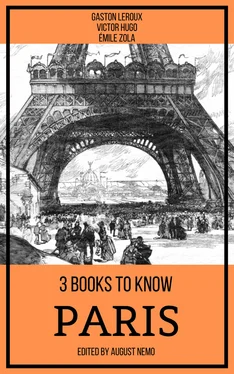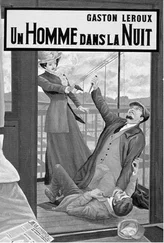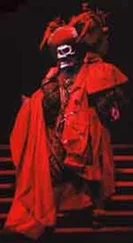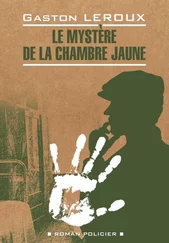Or rather, his whole person was a grimace. A huge head, bristling with red hair; between his shoulders an enormous hump, a counterpart perceptible in front; a system of thighs and legs so strangely astray that they could touch each other only at the knees, and, viewed from the front, resembled the crescents of two scythes joined by the handles; large feet, monstrous hands; and, with all this deformity, an indescribable and redoubtable air of vigor, agility, and courage,—strange exception to the eternal rule which wills that force as well as beauty shall be the result of harmony. Such was the pope whom the fools had just chosen for themselves.
One would have pronounced him a giant who had been broken and badly put together again.
When this species of cyclops appeared on the threshold of the chapel, motionless, squat, and almost as broad as he was tall; squared on the base, as a great man says; with his doublet half red, half violet, sown with silver bells, and, above all, in the perfection of his ugliness, the populace recognized him on the instant, and shouted with one voice,—
“‘Tis Quasimodo, the bellringer! ‘tis Quasimodo, the hunchback of Notre-Dame! Quasimodo, the one-eyed! Quasimodo, the bandy-legged! Noel! Noel!”
It will be seen that the poor fellow had a choice of surnames.
“Let the women with child beware!” shouted the scholars.
“Or those who wish to be,” resumed Joannes.
The women did, in fact, hide their faces.
“Oh! the horrible monkey!” said one of them.
“As wicked as he is ugly,” retorted another.
“He’s the devil,” added a third.
“I have the misfortune to live near Notre-Dame; I hear him prowling round the eaves by night.”
“With the cats.”
“He’s always on our roofs.”
“He throws spells down our chimneys.”
“The other evening, he came and made a grimace at me through my attic window. I thought that it was a man. Such a fright as I had!”
“I’m sure that he goes to the witches’ sabbath. Once he left a broom on my leads.”
“Oh! what a displeasing hunchback’s face!”
“Oh! what an ill-favored soul!”
“Whew!”
The men, on the contrary, were delighted and applauded. Quasimodo, the object of the tumult, still stood on the threshold of the chapel, sombre and grave, and allowed them to admire him.
One scholar (Robin Poussepain, I think), came and laughed in his face, and too close. Quasimodo contented himself with taking him by the girdle, and hurling him ten paces off amid the crowd; all without uttering a word.
Master Coppenole, in amazement, approached him.
“Cross of God! Holy Father! you possess the handsomest ugliness that I have ever beheld in my life. You would deserve to be pope at Rome, as well as at Paris.”
So saying, he placed his hand gayly on his shoulder. Quasimodo did not stir. Coppenole went on,—
“You are a rogue with whom I have a fancy for carousing, were it to cost me a new dozen of twelve livres of Tours. How does it strike you?”
Quasimodo made no reply.
“Cross of God!” said the hosier, “are you deaf?”
He was, in truth, deaf.
Nevertheless, he began to grow impatient with Coppenole’s behavior, and suddenly turned towards him with so formidable a gnashing of teeth, that the Flemish giant recoiled, like a bull-dog before a cat.
Then there was created around that strange personage, a circle of terror and respect, whose radius was at least fifteen geometrical feet. An old woman explained to Coppenole that Quasimodo was deaf.
“Deaf!” said the hosier, with his great Flemish laugh. “Cross of God! He’s a perfect pope!”
“He! I recognize him,” exclaimed Jehan, who had, at last, descended from his capital, in order to see Quasimodo at closer quarters, “he’s the bellringer of my brother, the archdeacon. Good-day, Quasimodo!”
“What a devil of a man!” said Robin Poussepain still all bruised with his fall. “He shows himself; he’s a hunchback. He walks; he’s bandy-legged. He looks at you; he’s one-eyed. You speak to him; he’s deaf. And what does this Polyphemus do with his tongue?”
“He speaks when he chooses,” said the old woman; “he became deaf through ringing the bells. He is not dumb.”
“That he lacks,” remarks Jehan.
“And he has one eye too many,” added Robin Poussepain.
“Not at all,” said Jehan wisely. “A one-eyed man is far less complete than a blind man. He knows what he lacks.”
In the meantime, all the beggars, all the lackeys, all the cutpurses, joined with the scholars, had gone in procession to seek, in the cupboard of the law clerks’ company, the cardboard tiara, and the derisive robe of the Pope of the Fools. Quasimodo allowed them to array him in them without wincing, and with a sort of proud docility. Then they made him seat himself on a motley litter. Twelve officers of the fraternity of fools raised him on their shoulders; and a sort of bitter and disdainful joy lighted up the morose face of the cyclops, when he beheld beneath his deformed feet all those heads of handsome, straight, well-made men. Then the ragged and howling procession set out on its march, according to custom, around the inner galleries of the Courts, before making the circuit of the streets and squares.
CHAPTER VI. ESMERALDA.
––––––––

WE ARE DELIGHTED TO be able to inform the reader, that during the whole of this scene, Gringoire and his piece had stood firm. His actors, spurred on by him, had not ceased to spout his comedy, and he had not ceased to listen to it. He had made up his mind about the tumult, and was determined to proceed to the end, not giving up the hope of a return of attention on the part of the public. This gleam of hope acquired fresh life, when he saw Quasimodo, Coppenole, and the deafening escort of the pope of the procession of fools quit the hall amid great uproar. The throng rushed eagerly after them. “Good,” he said to himself, “there go all the mischief-makers.” Unfortunately, all the mischief-makers constituted the entire audience. In the twinkling of an eye, the grand hall was empty.
To tell the truth, a few spectators still remained, some scattered, others in groups around the pillars, women, old men, or children, who had had enough of the uproar and tumult. Some scholars were still perched astride of the window-sills, engaged in gazing into the Place.
“Well,” thought Gringoire, “here are still as many as are required to hear the end of my mystery. They are few in number, but it is a choice audience, a lettered audience.”
An instant later, a symphony which had been intended to produce the greatest effect on the arrival of the Virgin, was lacking. Gringoire perceived that his music had been carried off by the procession of the Pope of the Fools. “Skip it,” said he, stoically.
He approached a group of bourgeois, who seemed to him to be discussing his piece. This is the fragment of conversation which he caught,—
“You know, Master Cheneteau, the Hôtel de Navarre, which belonged to Monsieur de Nemours?”
“Yes, opposite the Chapelle de Braque.”
“Well, the treasury has just let it to Guillaume Alixandre, historian, for six hivres, eight sols, parisian, a year.”
“How rents are going up!”
“Come,” said Gringoire to himself, with a sigh, “the others are listening.”
“Comrades,” suddenly shouted one of the young scamps from the window, “La Esmeralda! La Esmeralda in the Place!”
This word produced a magical effect. Every one who was left in the hall flew to the windows, climbing the walls in order to see, and repeating, “La Esmeralda! La Esmeralda?” At the same time, a great sound of applause was heard from without.
Читать дальше










